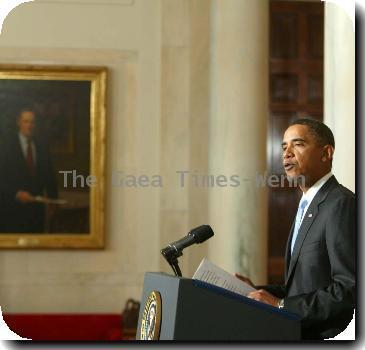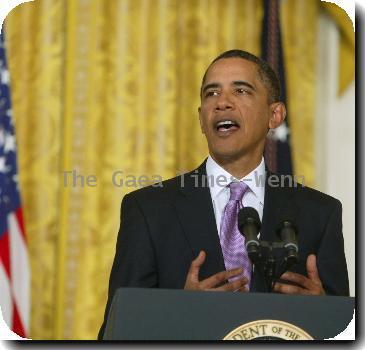US vice president’s West Bank tour overshadowed by new Israeli settlement plans in Jerusalem
By Karin Laub, APWednesday, March 10, 2010
Biden’s West Bank tour clouded by settlement plans
RAMALLAH, West Bank — Israel’s new plan to build 1,600 apartments for Jews in Palestinian-claimed east Jerusalem overshadowed Vice President Joe Biden’s visit to the West Bank on Wednesday.
Biden was to hold talks with Palestinian President Mahmoud Abbas and Prime Minister Salam Fayyad, in part to ease their doubts about the latest U.S. peace efforts. Israel’s Interior Ministry announced late Tuesday that it had approved the new construction, an embarrassing setback for Biden after a day of warm meetings with senior Israeli officials.
Fayyad said the Israeli announcement was “damaging” and posed a “great challenge” to restarting peace talks. Palestinian negotiator Saeb Erekat said the new construction would be the main item on the Abbas-Biden agenda.
“I think the Israeli government is making it almost impossible for us, the Americans and the international community, to take a one centimeter step in the direction of reviving the peace process,” Erekat said.
In an apparent snub, Biden pointedly arrived 90 minutes late to his scheduled dinner with Israeli Prime Minister Netanyahu and he sharply rebuked the Israeli step — which came just after the Palestinians agreed to a new round of indirect peace talks under U.S. mediation after a 14-month lapse.
“The substance and timing of the announcement, particularly with the launching of proximity talks, is precisely the kind of step that undermines the trust we need right now,” Biden said.
“We must build an atmosphere to support negotiations, not complicate them,” he added, warning that “unilateral action taken by either party cannot prejudge the outcome of negotiations.”
Fayyad said the Palestinians appreciated “the strong statement of condemnation” by the U.S. administration.
The new construction plan also drew a sharp rebuke from Egypt, Israel’s closest ally in the Arab world, and from U.N. Secretary-General Ban Ki-moon.
“This is absurd. It is disdainful of the Arab and the Palestinian positions and the American mediation,” said Hossam Zaki, a spokesman for the Egyptian Foreign Ministry.
Israeli media lambasted the move, calling it an embarrassment.
“A slap heard round the world,” read the headline of a front-page commentary in Israel’s Haaretz daily.
Israel’s refusal to halt building on war-won land has infuriated the Palestinians and undermined their faith in the U.S. as an effective mediator.
President Barack Obama initially called for a complete settlement freeze, but did not take Israel to task when it only agreed to a 10-month moratorium on housing starts in the West Bank. Netanyahu refuses to stop building in east Jerusalem, saying he will never partition the city.
The Palestinians want east Jerusalem, captured by Israel in the 1967 Mideast War, as their future capital.
Earlier this week, the Palestinians reluctantly agreed to indirect negotiations with Israel, with U.S. Mideast envoy George Mitchell to shuttle between Abbas and Netanyahu in coming months.
Abbas has said he won’t resume direct negotiations without a settlement freeze, leaving the U.S. no choice but to arrange the indirect talks in hopes of ending the impasse.
Growing settlements take up more and more of the land the Palestinians want for their state and make partition increasingly difficult. Today, nearly 300,000 Israeli settlers live in the West Bank and 180,000 in east Jerusalem.
The ongoing construction is also eroding domestic support for Abbas and his policy of trying to negotiate the terms of Palestinian statehood with Israel.
Many Palestinians are critical of U.S.-led peace efforts, saying two decades of on-and-off negotiations have deepened Israeli control over the lands they want for their state, instead of bringing them closer to independence.
The latest Israeli building plan is undermining Abbas, said Erekat. “It’s a really disastrous situation. I hope that this will be an eye-opener for all in the international community.”
Israel claimed the timing of the announcement was coincidental.
At Tuesday’s dinner, Netanyahu told Biden he was caught off guard by the ministry’s announcement, a senior Israeli official said, speaking on condition of anonymity because the dinner was closed.
While Netanyahu considers east Jerusalem to be part of Israel, he acknowledged the timing of the announcement was poor and said he had no intention of sabotaging Biden’s visit. He stressed that there are no plans to begin construction anytime soon.
Tags: Barack Obama, International Agreements, Israel, Jerusalem, Middle East, North America, Palestinian Territories, Ramallah, Territorial Disputes, United States, West Bank





